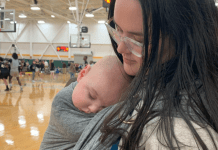A NICU nurse weighs in on the pros and cons of home birth.
I hesitated a long time in writing this article about home birth for many reasons. But as more and more moms consider birthing babies at home, I felt that my personal and professional experiences could be helpful. This article is part one in a home birth series. The series will reveal what you need to know, risks and benefits, and ways to choose a provider.
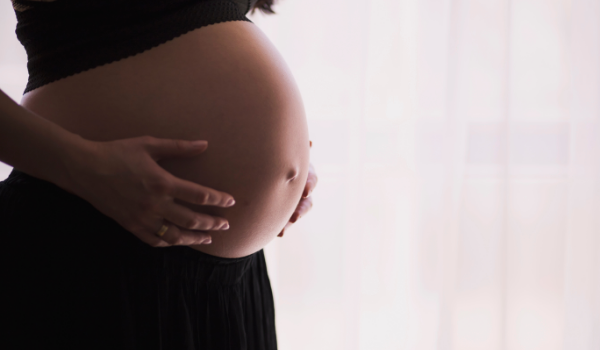
Let me begin by laying some ground rules:
While I am a registered nurse, I am not your registered nurse.
Everything I say here is information for you to take back to your provider (OB, CNM, CPM, etc). Once you discuss with your provider, you can make an informed decision based on your specific medical needs and personal desires. This home birth series is not and should be considered medical advice. It is simply meant to be a resource as you ask questions and gather information about home birth.
You don’t get a medal for how you deliver your baby.
I’m going to step on some toes here, but you aren’t a better mom for delivering without an epidural, nor are you a worse mom for having one (or a cesarean)! Babies rarely come the way we plan for them, and we all end up bleeding and bruised and sore, celebrating the absolute miracle that new life is.
**Moms of NICU and angel babies, my caveat here is that you do get medals—you are some of the strongest women I know, and I hope the people around you remind you of that daily.**
You are not a failure if your planned home birth ends up at the hospital.
The hospital is a magical place where people—doctors, nurses, respiratory therapists, anesthesiologists, etc.—work their tails off to save lives. If your labor starts getting scary, it is a gift to be able to go to the place where teams of people are trained to take care of you and your baby. Surviving childbirth used to be a big deal, and thanks to hospitals, we largely take it for granted now, but let me remind you: don’t. A healthy baby (and a healthy mom!) is a miracle, whether you deliver peacefully in your bathtub or knocked out during an emergency c-section.
My Experience With Home Birth
I began working in a NICU in 2016, and in 2018, I had my first child. I planned to deliver her in the hospital without an epidural. But at 41 weeks, my daughter was medically induced. After over 24 hours of labor that didn’t progress, I broke down and got an epidural. It was amazing—I took a quick nap and delivered a healthy baby girl.
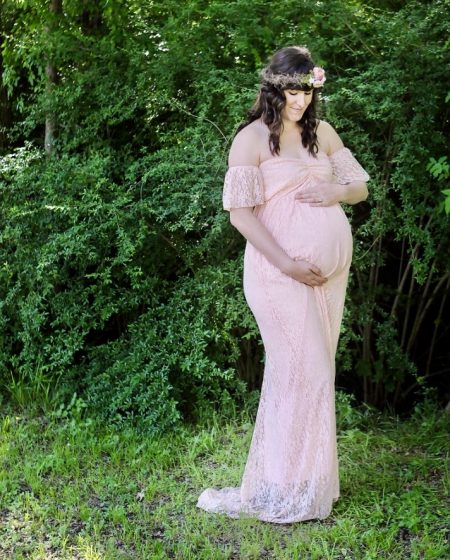
In 2019, I found out I was pregnant by surprise. We were in the middle of a cross country move with no jobs and no health insurance. We were denied Medicaid due to a processing error. A family friend and a Certified Nurse Midwife offered to do my prenatal care while I figured out my plans. After grilling her extensively, and having no good alternatives, this once extremely anti-home birther safely delivered a nine-pound-fourteen-ounce baby girl at home.
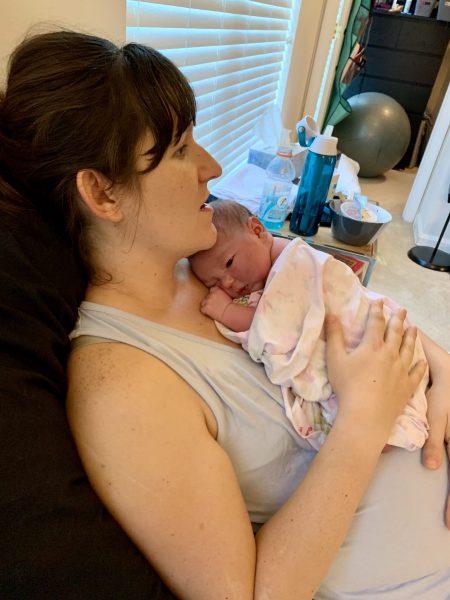
It’s 2020, we are in full pandemic restrictions, and I’m pregnant with number three. I’ll walk you through my thought process and current delivery decisions over the next few posts!
Does the hospital want to separate me from my baby?
The short answer is no: if you go to the hospital, our goal is not to separate you from your baby. We want you to have a healthy delivery. Sometimes that means your medical team may do things without explaining the rationale well. But please know that what we’re doing is our absolute best to keep you and your little one(s) safe.
I think this is one area where I would strongly encourage you to talk to your provider before going into labor. Ask all the questions you can think of. Why does the hospital monitor babies? What is the threshold for vaginal and cesarean deliveries? Why would we consider or encourage an induction? What types of situations could send a baby to the NICU? These are hard conversations, I know, but the more informed you are, the less scary it is if everything goes wrong. I’ll walk you through some emergencies that can happen and helpful questions to ask your provider as the Home Birth series continues!
Additionally, it’s important to remember that the hospital exists for emergencies. There are some real reasons that you would not qualify for a home birth. You or your baby need more medical care than a midwife and her birth assistant can provide. And that’s ok! It’s a great blessing to live in a time and a place where we can save moms and babies from all kinds of emergencies, so if you end up delivering in a hospital, either by choice or by circumstance, I want to encourage you not to view it as a failure, but truly as a blessing: you have a team of trained professionals fighting for you and your child. We know what we’re doing—because we do it every day—and you’re going to receive incredible care.
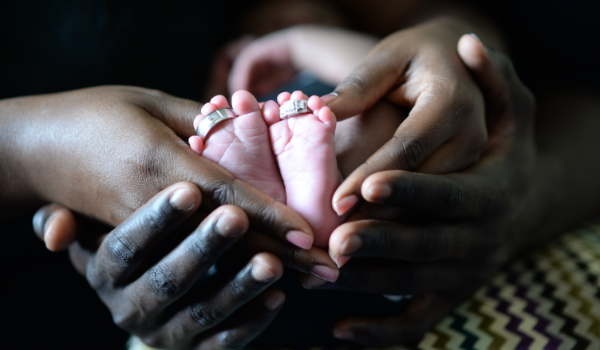
What are all those letters?
Certified Nurse Midwife (CNM)
A Certified Nurse Midwife (CNM) is a midwife who attended nursing school, graduated with her BSN, sat for her NCLEX to get her RN (registered nurse), likely worked in a labor and delivery setting for some time, then went to graduate school to study midwifery, and sat for her Certified Nurse-Midwife Examination. Depending on where and when she went, that’s a Masters or Doctoral level of education. She is registered through her state and must maintain her credentials. CNMs can administer medications, deliver babies in certain hospitals, and may have a relationship with an OB practice that allows them to admit to the hospital should something happen before or during labor.
Certified Professional Midwife (CPM)
A Certified Professional Midwife (CPM) is a direct-entry midwife, meaning she did not begin her career as a nurse, however they also attend schooling, receive credentialing through the North American Registry of Midwives, and most states recognize them as licensed care providers (though each state differs on their scope of practice). CPMs are trained in out-of-hospital birth settings, and are internationally recognized as women’s health care providers.
Lay or Traditional Midwife
A Lay or Traditional Midwife is a midwife who does not have licensing, certifications, or hospital admission rights. She makes her own clinical decisions based on whatever training she has deemed appropriate.
Doula
A Doula is not a midwife. While they are an amazing support role, doulas should not be responsible for any medical care or decisions. You may find a doula who is currently in nursing or midwifery school. While that is a great bonus, her scope of practice is and should be strictly limited to your comfort during and after labor, not you or your child’s medical condition.
Neonatal Resuscitation Program (NRP)
Neonatal Resuscitation Program (NRP) is an “evidence-based approach to the care of the newborn at birth. It also facilitates effective team-based care for healthcare professionals who care for newborns at the time of delivery.” The American Academy of Pediatrics (AAP) recommends that there should be at least one person present who is trained in neonatal resuscitation for each baby.
As you’re interviewing midwives, it’s extremely important to ask if they are NRP certified. Additionally, it’s important to find out if their birth assistant is also NRP certified. Healthy, term babies can be born with unforeseen complications. Knowing the steps of NRP can be the difference between your child living and dying.
Birth Assistant
The Birth Assistant is a second person who attends the delivery with the midwife. She may or may not be a midwife / midwife-in-training, but she should at a minimum be NRP certified. Her primary responsibility is to make sure that mom and baby receive medical attention at the same time if needed. As you interview midwives, make sure to ask about their birth assistant and find out about her training + certification?
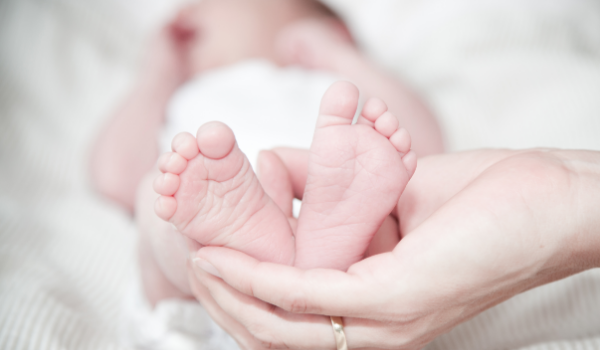
In part two of the DC Area Moms Home Birth series, I’ll discuss possible risks of a home birth. You’ll want to make sure your midwife has a plan for responding to whatever emergency situation may arise.
What questions do you have? Moms who have had home births, what advice do you have? Moms who are considering a home birth, what do you want to know?









